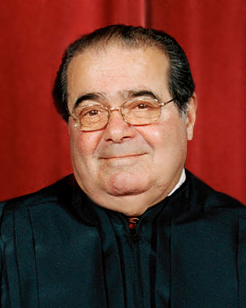 Antonin Scalia
Antonin Scalia
Antonin Scalia, a justice on the United States Supreme Court, died on February 13, 2016, at the age of 79, according to the obituary in The New York Times (February 14, 2016). Appointed by President Ronald Reagan, Scalia served on the court from 1986 until his death. The Times wrote of the controversial Scalia that his "transformative legal theories, vivid writing and outsize personality made him a leader of a conservative intellectual renaissance in his three decades on the Supreme Court."
With regard to science education, Scalia is remembered for his dissenting opinion in Edwards v. Aguillard (1987), in which the Supreme Court ruled that Louisiana's Balanced Treatment for Creation-Science and Evolution-Science in Public School Instruction Act violated the Constitution. While the Supreme Court agreed with the district court and the court of appeals that the act was unconstitutional because it was intended to discredit evolution by promoting creationism, Scalia (joined by William Rehnquist) was skeptical both of the court's claim to be able to detect the intentions of the legislature and of the relevance of intention to constitutionality. He famously asserted, "The people of Louisiana, including those who are Christian fundamentalists, are quite entitled, as a secular matter, to have whatever scientific evidence there may be against evolution presented in their schools." The dissent elicited a rebuttal from Stephen Jay Gould, "Justice Scalia's Misunderstanding" (1987), in which Gould lamented, "Justice Scalia does not understand the subject matter of evolutionary biology. He has simply adopted the creationists' definition and thereby repeated their willful mistake." Undeterred, Scalia later repeatedly took the opportunity to condone antievolution tactics, as in his dissents to the court's decision not to hear appeals in Freiler v. Tangipahoa (2000) and LeVake v. Independent School District #656 (2002).
Scalia was born on March 11, 1936, in Trenton, New Jersey. He graduated from Georgetown University in 1957 and Harvard Law School in 1960, practiced law in Cleveland, and then became a law professor at the University of Virginia in 1967. He worked for the federal government in various capacities from 1971 to 1977, when he became a law professor at the University of Chicago. He was appointed to the United States Court of Appeals for the District of Columbia in 1982, where he served until he was named to the Supreme Court.
